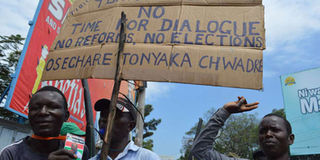Why election crisis poses risk to stability

Kisumu residents take part in anti-IEBC protests on October 16, 2017. The push for the ouster of IEBC officials the opposition leaders consider tainted continues today. PHOTO | ONDARI OGEGA | NATION MEDIA GROUP
What you need to know:
- Mr Odinga and his allies have been calling for anti-IEBC street protests to force the implementation of their demands.
- The opposition appears keen to bypass the voters and the electoral system on their way to political power.
Nasa leader Raila Odinga has pulled out of the October 26 presidential election, accusing the IEBC of failing to fulfil the coalition’s 11-point irreducible minimum conditions before the poll can take place.
Mr Odinga and his allies have been calling for anti-IEBC street protests to force the implementation of their demands.
These developments have thrown the country into a political tailspin, with pundits trying to navigate the “uncharted political waters”.
VIOLENCE
Without a doubt, Mr Odinga has been at the forefront in fighting for political and constitutional change for many years.
But while many may attribute his political engagements to democratic ethos, his methodology often raises eyebrows and brings one to query his real motives.
His apparent anti-establishment, anti-institutions and anti-order history is well-known.
The 1982 coup attempt in which he was implicated aside, what also stands out like a sore thumb is the aftermath of the 2007/8 post-election chaos with the wanton loss of lives, destruction of property and the displacement of thousands of people that further split the country along ethnic lines and dominated international news outlets and academic journals, as experts tried to decipher the “Kenyan crisis”.
PEACE
The creation of the Prime Minister’s position to actualise a power-sharing agreement between Mr Odinga and then-President Mwai Kibaki assuaged opposition concerns, resulting in an uneasy peace.
He appeared to have achieved his goal of gaining political power, albeit temporarily.
But after the 2013 elections, Cord was at it again with rigging claims, instigating public protests that culminated in an anti-IEBC movement that saw even the government give in to calls for the commissioners’ resignation.
This led to the replacement of the Issack Hassan-led team last year.
VOTERS
The push for the ouster of IEBC officials the opposition leaders consider tainted continues today.
The opposition appears keen to bypass the voters and the electoral system on their way to political power.
Indeed, they had filed a record 27 election-related cases in the courts in the lead-up to the August 8 elections.
However, the IEBC withstood the storm that played out in the public and legal arenas and went ahead to organise the elections.
DEMOS
After losing the presidential poll, Nasa took the matter to the Supreme Court of Kenya, which ruled in their favour, and ordered a fresh election in 60 days, citing massive election irregularities and illegalities.
However, despite its court victory, Nasa has continued to be a stumbling block, with its increased anti–IEBC demos in a push for what they term as “irreducible minimum” conditions.
The IEBC has made some concessions to the opposition, including granting presidential candidates’ agents access to electoral servers and the simultaneous transmission of electoral forms with keyed-in results.
CHILOBA
Like others before him, IEBC Chief Executive Officer Ezra Chiloba appears to have fallen out of the good books of the opposition.
Nasa has made Mr Chiloba the personification of the so-called “systemic problems” of the IEBC and the “irregularities and illegalities” that led to the nullification of the presidential poll.
Mr Odinga has often used the Swahili proverb Asiyekubali kushindwa si mshindani (whoever does not accept defeat is not a good competitor).
But he does not seem keen to live up to those words.
If, indeed, Mr Odinga was committed to fighting for democracy, why would he then leave the contest midstream?
What could he be having up his sleeve. Could this be just about the quest for political power?
Mr Mugwang’a is a communications consultant based in Nairobi. [email protected]




